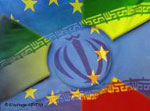 Wall Street Journal: Faced with U.S. pressure to move faster in isolating Iran’s financial sector to choke off funds for Tehran’s nuclear program, the European Union took an action last week that officials in Brussels admit goes well beyond the carefully-calibrated sanctions they originally intended.
Wall Street Journal: Faced with U.S. pressure to move faster in isolating Iran’s financial sector to choke off funds for Tehran’s nuclear program, the European Union took an action last week that officials in Brussels admit goes well beyond the carefully-calibrated sanctions they originally intended.
The Wall Street Journal
By Laurence Norman
 Faced with U.S. pressure to move faster in isolating Iran’s financial sector to choke off funds for Tehran’s nuclear program, the European Union took an action last week that officials in Brussels admit goes well beyond the carefully-calibrated sanctions they originally intended.
Faced with U.S. pressure to move faster in isolating Iran’s financial sector to choke off funds for Tehran’s nuclear program, the European Union took an action last week that officials in Brussels admit goes well beyond the carefully-calibrated sanctions they originally intended.
In January, divided between countries who wanted to move quickly to toughen up sanctions and others who were more reluctant, the EU agreed a compromise: They would start a full oil embargo on Iranian crude exports on July 1, they sanctioned a number of Iranian individuals, banks and other firms, and slapped partial restrictions on the central bank.
However to avoid hurting normal Iranian businesses, they allowed the central bank an exemption that permitted it to make and receive payments for legitimate, non-oil trade with European companies.
Last Thursday, the EU took an additional step, ordering European firms to cut off blacklisted Iranian banks from any financial transactions or communications. The measure was aimed mainly at Belgian-based Society for Worldwide International Financial Telecommunication, which is used by the majority of the world’s larger banks to send secured messages crucial to making international transfer payments.
When the new legislation was published on Friday, it stated clearly that the exemptions allowed the central bank in January also applied to the ban on financial message services.
Only one problem with that: “SWIFT cannot partially disconnect a bank,” a SWIFT spokesman said. “EU-sanctioned banks will be disconnected from SWIFT and they will no longer have access to the global secure messaging service of SWIFT.”
In other words, Iran’s central bank was being entirely thrown off the SWIFT system whatever the purpose of the transactions.
Several European diplomats confirmed officials were aware of the issue and that it was discussed in the lead-up to last week’s measure.
They make two points:
Faced with growing Congressional pressure to penalize SWIFT if it didn’t cut ties with Iran’s banks, they had little choice.
Payments through the central bank for legitimate purposes can still happen, just not through SWIFT.
Certainly, the EU was–and remains–under pressure from Washington. Congress is now crafting legislation which would hit SWIFT’s board and directors unless they cut ties with all Iranian banks– sanctioned or not.
U.S. lawmakers argue that Tehran is now channeling funds through non-sanctioned banks to finance its nuclear program.
It’s also true that international payments can still be made–but they will take longer and be costlier.
SWIFT is like a postal service for financial transactions. It pings messages around the international banking system in a common language, under fixed settlement conditions in a secure fashion at the click of a button. The messages it carries ensure financial payments are safely sent and received.
Without SWIFT, Iran’s central bank can send financial messages by fax or secured emails for legitimate businesses to European banks. But they’d have to agree legal terms on precisely when a payment should be settled, the messages would need translating into a commonly understood language and secure communication lines would be needed between the central bank and each of their counterparties – banks from Paris to Bucharest.
And there’s the rub. The cost of this will almost certainly fall on the end-user–the owner of a mid-sized Tehran-based importer or exporter, for example. In other words, just the type of people Brussels was hoping to avoid hurting.


